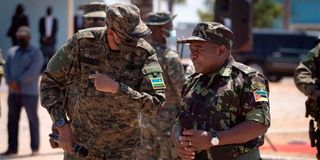Mozambique's Nyusi says jihadist attacks dropped in 2021

Mozambican President Filipe Nyusi (right) and Rwanda President Paul Kagame, both wearing military fatigue, are seen on September 24, 2021 in Pemba, Cabo Delgado province, Mozambique, during a visit to the Rwandan and Mozambican soldiers deployed there.AFP
Mozambique's President Filipe Nyusi Thursday said his country had witnessed fewer jihadist attacks this year than last, after Rwanda and neighbouring countries helped tackle the four-year insurgency.
The country's gas-rich Cabo Delgado province has been rocked by attacks by Islamic State-linked militants since 2017, killing at least 3,340 people and displacing more than 800,000 others.
But since July, more than 3,100 African, European and US soldiers have been deployed to the northern province to quell the unrest.
Despite ongoing attacks against villages and civilians on a weekly basis, Nyusi told parliament that these efforts had been partially successful.
"We were able to reduce terrorist attacks by three times," he said.
While in 2020 the country registered just over 160 attacks, that number was reduced to 52 in 2021, he said.
He said it was thanks in part to "military cooperation" with Rwanda and the 16-nation Southern African Development Community of its neighbouring countries.
Nyusi said recent operations had led to the capture of "245 suspected terrorists", and killing of about 200 "terrorists" and 10 "terrorist leaders".
Addressing fears the jihadists were instead spreading to territory adjacent to Cabo Delgado, he said some suspected fighters had also been captured in the province of Niassa.
Nyusi however discouraged the displaced from returning to their villages.





